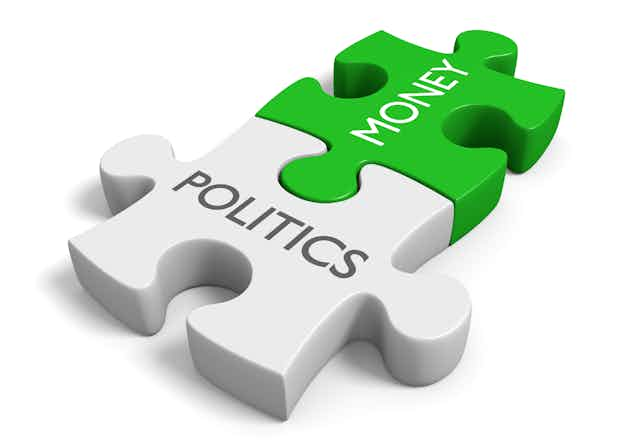In the aftermath of the controversy surrounding former MP Jami-Lee Ross and opposition National party leader Simon Bridges, discussions have focused on possible reforms of political donations in New Zealand.
My colleagues Bryce Edwards and Michael Macaulay have raised the issue of taxpayer funding of political parties. So too has Minister of Justice Andrew Little.
Green Party MP Marama Davidson has suggested the donation threshold for the disclosure of a donor’s name and address be lowered from NZ$15,000 to NZ$1,000. She has also proposed banning foreign donations outright and capping individual donations at NZ$35,000.
Several of these proposals warrant further discussion and contextualisation.
Read more: New Zealand politics: foreign donations and political influence
Donations and foreign money
Foreign interference in domestic politics is an increasing phenomenon worldwide.
Currently in New Zealand foreign donations to a party of up to NZ$1,500 are permissible. Moreover, foreign donations below this amount are not individually or collectively disclosed.
It would be easy for a foreign state or corporate body seeking political influence to channel a large number of donations into the system just under the threshold via numerous proxies. Whether such interference has been happening is unclear, since New Zealanders do not know how much money currently comes in to political parties via foreign actors.
Even if foreign donations are not a problem now, one could rapidly develop. A strong argument can be made that foreign money has no place in democracy, including New Zealand’s.
New Zealand would not be going out on an international limb by banning foreign donations. Foreign donations to political parties are not permissible in the [United Kingdom, Ireland and the United States. They are also banned in Canada but unfortunately a significant loophole exists. Australia is currently in the process of banning foreign donations.
Lowering threshold for anonymous donations
As noted, the threshold below which political donations can be anonymous could be lowered. A lower threshold would make it more difficult to evade name disclosure rules by splitting donations and attributing each part to a different donor.
Splitting may be what happened to the alleged NZ$100,000 Yikun Zhang donation. The NZ$1,000 threshold proposed by the Greens would be a huge improvement on the status quo. A donor of NZ$100,000 seeking to evade legislation and to remain anonymous would have to coordinate 100 individual donors, rather than seven.
But New Zealand could go lower still, to NZ$200, without being radical. Giving NZ$200 to a political party is huge for an ordinary New Zealander, and the reality is only a very small minority would need to disclose their names under such a law.
There is international precedent for setting much lower thresholds for anonymity than the Greens propose. For example, in Canada, the maximum amount of an anonymous donation was set at C$200 in 2015, while in Ireland it is currently €100.
Donor privacy versus transparency
One concern with non-anonymity is that it delivers public transparency at the cost of private donor privacy. Currently the Electoral Act 1993 contains a mechanism for anyone wanting to donate to a political party and not wanting their identity disclosed to either the public or to the party receiving the donation. To obtain such anonymity, the donation needs to be more than NZ$1,500.
The Electoral Commission aggregates all such donations. It passes them on to parties at regular intervals. It does not identify the dollar amount of individual donations, or the number or names of donors.
Not many donors use this protected disclosure avenue. For example, between September 2015 and June 2018, the commission passed on only NZ$150,000 in anonymised money to parties via this channel. At the same time amounts well in excess of NZ$10 million were passed on by donors identifiable to political parties (but not necessarily to the public).
A preference for identifiable channels suggests current donors get value from non-anonymity. It implies most donors feel they are buying something. The fact that donors feel they are buying something should be cause for concern.
Capping donations and individualising donors
The Greens have suggested NZ$35,000 as a maximum cap on donations. Again, New Zealand could go much lower without being out of step with other countries. For example, in Canada donations to each political party are capped at C$1500 a year. Like Canada, Ireland has a maximum annual cap of €2500.
However, Geoff Simmons, leader of the Opportunities Party, has argued that a cap would make it difficult for small parties to get started. Simmons’ party was kick-started by large donations from multi-millionaire Gareth Morgan, who was also the party’s first leader.
Another possibility for the reform agenda is the Canadian approach of only permitting donations from individual people. Corporate and trade union donations are banned. However this proposal is unlikely to be popular with neither National, which receives considerable corporate donations, nor Labour, which traditionally gets significant trade union funding.
All these proposals, inevitably, have pros and cons and possible unintended consequences. They are deserving of wide public debate. One hopes that the current government can provide the public with a credible forum for such discussions, and a clear pathway to sensible future reform.

